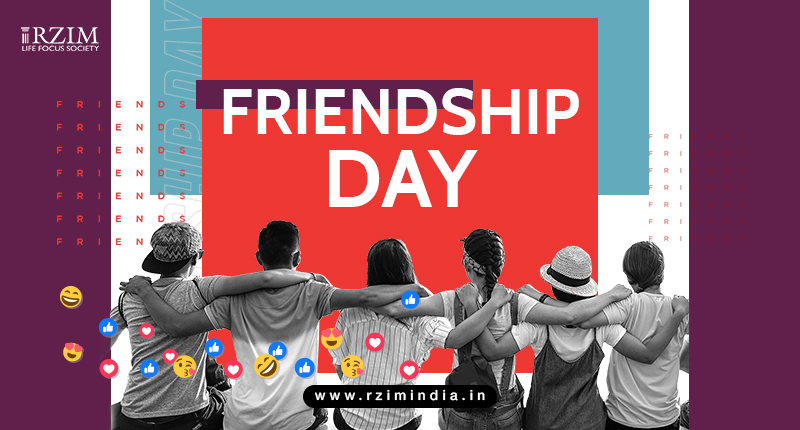Friendship Day
In his survey of the most popular and enduring TV series of recent times, Sydney-based writer, Nathan Jolly 1 found that the famous American sitcom Friends which is built around six friends who are always there, with and for each other, physically and emotionally, topped the list with a whopping 16 million American viewers each week. Perhaps, the phenomenon is not hard to understand. Friendship – the word strikes a chord at the deepest level of our beings. If food and water are the basic building blocks of human physical growth and survival, friendship and relationship is its absolute emotional requisite.
Philosophies and empirical studies across the ages have universally recognized friendship as an integral component of human happiness and well being (Watson 2 ). Aristotle proposed that friendship is, at the very least, a relationship of goodwill between individuals who reciprocate that goodwill. In our contemporary world, however, the word ‘friend’ or ‘friendship’ is being redefined. We have thousands of online friends whom we connect and interact with daily and even hourly, through social media, and yet, it has become an even lonelier world somehow. Talk to any young person out there and you’ll know what I mean.
Perhaps, C. S. Lewis’ 3 comment on friendship rings more true today than it did during his lifetime. “We live”, he said, “in a world starved for meditation and true friendship”.
True friendship! What does it mean?
Aristotle 4 grouped friendship into three categories: The first category of friendship stems from a common dependency and usefulness to each other, like the friendship between an employee and a boss, or a doctor and a patient, or a politician and an ally; they share goodwill because they get something out of the relationship. The second category of friendship comes from a common interest or shared pleasure of certain things; it could be football, shopping, books or travel and so on, but the friendship thrives in so far as the thing that gives the pleasure continues to exist between them. Aristotle noted that these first two groups are therefore like each other because if you take the utility or the pleasure quotient away, then the chances are that the friendship will fade. Then there is the third group.
These are friends who love each other because of who they are in themselves. It may be their depth of character, their innate goodness, their intensity of passion or their simple joie de vivre, but once established these friendships are ones that tend to last. Undoubtedly, much will be given and much taken too, but the friendship itself is independent of external factors and immensely more valuable than the friendships that fall into the first two groups.
Although our online culture seems to suggest that it is possible to have thousands of friends yet, the reality is vastly different. There are very few people whom we can truly call our friends. As studies have indicated, having the companionship and support of true friends is key to living healthy, vibrant and fulfilled lives.
Understanding this reality, the Bible gives much value and importance to friendship, the most famous being David and Jonathan – “The soul of Jonathan was knit to the soul of David, and he loved him as his own soul”, so much so, that Jonathan was willing to risk the displeasure and wrath of his father for David’s sake. Proverb speaks of “a friend who sticks closer than a brother”, and Jesus speaking to his disciples said, “greater love has no one than this, that he lay down his life for his friends. You are my friends…” Thus, the friendship enshrined in the Bible is one that is self-giving, loyal and even self-sacrificial. It is something that endures the shift and change in circumstances and fortunes and thrives on honesty and truth. As the theme song from the sitcom Friends says: I’ll be there for you / when the rain starts to pour / I’ll be there for you / Like I’ve been there before / I’ll be there for you / Cause you’re there for me too . . .
How revealing the lines are. It reveals to us the human hunger for a friend who will always be there for us no matter what. And that’s what God’s friendship offers: “I will never leave you nor forsake you, for behold! I am with you to the end of time”, he promised his friends.
He is there with us and for us and will always be there with us to the end of time, in a way that no human friend can.
The friend who can be silent with us in a moment of despair or confusion, who can stay with us in an hour of grief and bereavement, who can tolerate not knowing… not healing, not curing… that is a friend who cares – Henri Nouwen 5
References:
1 Jolly, Nathan @ news.com.au August 16 th 2018
2 Watson. G. (1930) Happiness among Adult Students of Education. Journal of Educational Psychology, 21, 79-109
3 Lewis, C.S. The Business of Heaven, 207
4 Aristotle, Nicomachean Ethics
5 Nouwen, J.W. Henri The Road to Daybreak: A Spiritual Journey, 1988

